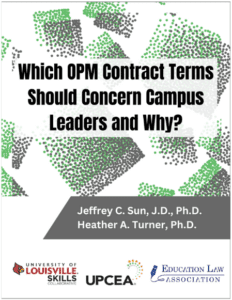Which OPM Contract Terms Should Concern Campus Leaders and Why?
 UPCEA is pleased to announce the release of a new brief, “Which OPM Contract Terms Should Concern Campus Leaders and Why?,” authored by Jeffrey C. Sun, J.D., Ph.D. and Heather A. Turner, Ph.D., and published jointly by the University of Louisville SKILLS Collaborative, Education Law Association, and UPCEA.
UPCEA is pleased to announce the release of a new brief, “Which OPM Contract Terms Should Concern Campus Leaders and Why?,” authored by Jeffrey C. Sun, J.D., Ph.D. and Heather A. Turner, Ph.D., and published jointly by the University of Louisville SKILLS Collaborative, Education Law Association, and UPCEA.
When deciding whether to partner with an online program manager (OPM), Chief Online Learning Officers (COLOs) have a lot to consider. This process usually starts with evaluating the university’s current online learning capabilities, followed by issuing a request for proposals (RFP) to gather options from different OPMs. At this stage, COLOs often focus on how well each company aligns with their university’s mission, identity, and values—a crucial factor highlighted in our previous research. Another important step is assessing the university’s own operations, which helps determine whether the institution can address its online learning needs in-house or if it truly requires external support to overcome capability and capacity challenges.
Ultimately, the success of the partnership often hinges on the details of the contracting process. The contract serves as the foundation upon which parties may build a productive relationship. With contracts, especially those involving external partnerships, clarity and foresight are essential, yet also difficult to anticipate. Our previous research about university agreements with OPMs reveal that contract terms and definitions dictate the extent to which the university may act in an agile and responsive manner when circumstances change.
In this brief, we present key contract terms that campus leaders should consider when contracting with OPMs. We focused on three major areas — finances, academics, and performance — based on COLO reports of contract terms that presented the most challenging areas to anticipate, negotiate, or frame. For each of these areas, we provide example contract terms that come from our review of 48 contracts between OPMs and universities across the US. For each set of terms, we offer one example that should be avoided (highlighted in red), one that is okay but could use some adjustments (in yellow), and one that is most beneficial to the university (in green). This brief should serve as a resource for any campus member involved in contracting with third-party vendors, as many of the terms have applicability to outsourcing beyond OPMs.
Other UPCEA Updates + Blogs
UPCEA Recognizes University of Phoenix for Excellence in Online Learning
University of Phoenix receives recognition for a high-quality online education program WASHINGTON, D.C. (May 6, 2021) — UPCEA, the…
Evaluating Online Teaching: Interviewing Instructors with 10+ Years Experience
We have been discussing online learning efficacy since its inception, with conversations and research focusing on factors such as student…


